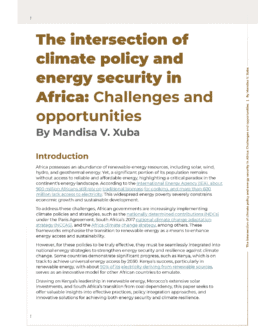Africa is home to immense renewable energy potential such as solar, wind, hydro, and geothermal, yet remains one of the most energy-insecure regions globally. With over 600 million people lacking access to electricity and close to 900 million relying on traditional biomass for cooking, the continent faces a critical developmental paradox. This report examines the intersection of climate policy and energy security in Africa, with a comparative analysis of Kenya, Morocco, and South Africa, three countries at the forefront of the continent’s clean energy transition.
While climate frameworks such as nationally determined contributions (NDCs) signal political will, a disconnect persists between long-term climate goals and immediate energy access needs. Investment shortfalls, import dependency, regulatory inefficiencies, land acquisition disputes, and skills shortages continue to impede progress. At the same time, climate change threatens the reliability of energy systems, particularly those reliant on water-intensive infrastructure.
Kenya leads in renewable energy integration, with over 90% of its electricity sourced from clean energy, yet struggles with affordability and land use conflicts. Morocco has made bold investments in solar, wind, and green hydrogen, positioning itself as a potential regional energy exporter, even as coal remains a dominant source. South Africa’s coal dependence, power instability, and socio-economic challenges illustrate the tensions of transitioning in a deeply carbon-intensive economy.
This report argues that a just energy transition in Africa must go beyond decarbonisation, it must ensure equitable access, affordability, and resilience. Recommendations include integrating climate and energy planning, unlocking inclusive financing, strengthening local skills and supply chains, and enhancing regional cooperation.
By bridging the gap between ambition and implementation, Africa can chart a sustainable, equitable energy future that aligns climate resilience with developmental priorities.
About the author
Mandisa Xuba is an Economist and Policy Analyst with a focus on climate resilience, sustainable energy, and macroeconomic policy in Africa. She leads impactful research on climate and energy transitions across the continent, with a particular interest in aligning policy with social equity and long-term development goals.
Mandisa is a recipient of a prestigious research grant from the Africa-China Reporting Project at Wits University and her current research—The Intersection of Climate Policy and Energy Security in Africa, offers comparative insights from South Africa, Kenya, and Morocco.
Her work spans Sustainable Development Goal (SDG) implementation, legislative and institutional frameworks, and energy policy reform. She has contributed directly to South Africa’s Voluntary National Review through the civil society-led People’s Report and has authored influential publications and thought pieces, including “How South Africa Can Accelerate Its Transition to Green Energy” and “The Eco-Currency: A New Chapter for West Africa.”
Mandisa holds an advanced qualification from the London School of Economics (LSE) and is currently pursuing a Master’s in Finance and Economic Policy at the University of London. She applies her expertise to shape inclusive, data-informed policies that drive sustainable growth and climate resilience across Africa.

